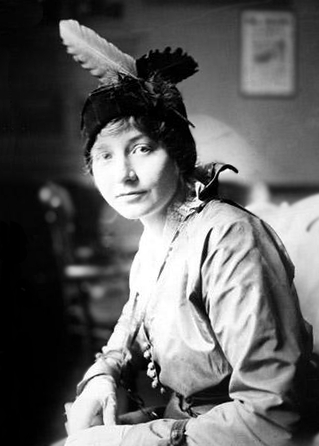Top Qs
Timeline
Chat
Perspective
Alice Gerstenberg
American dramatist From Wikipedia, the free encyclopedia
Remove ads
Alice Erya Gerstenberg (August 2, 1885 – July 28, 1972) was an American playwright, actress, and activist best known for her experimental, feminist drama and her involvement with the Little Theatre Movement in Chicago.
Remove ads
Background
Gerstenberg was born in Chicago, Illinois, the only child of Julia and Erich Gerstenberg. Gerstenberg's grandfather was a founder and member of the Chicago Board of Trade in 1848, a position Gerstenberg's father inherited later on, which meant that the Gerstenbergs enjoyed a higher standard of living than most middle-class families in Chicago at the time.[1] Growing up, Gerstenberg had ample travel experiences and social indulgences including commercial theater. She attended a private school in Chicago and graduated from Bryn Mawr College in 1907. After college, she spent some time in New York watching the rehearsals of David Belasco before returning home to Chicago.[2]
Remove ads
Career
Summarize
Perspective
After living in New York for a period, Gerstenberg returned to Chicago, where she continued to write plays; became involved with the Little Theatre movement, supported her parents, and exercised a strong feminist dedication to bringing non-commercial theater to new playwrights, children, and Chicagoans.[1] Her previous involvement with the theater during her childhood, the plays she wrote at college, as well as the time spent in New York led her to continue writing plays for the rest of her life, working occasionally as an actress, and maintaining an activist role in the theater. Overtones has continued to be produced since its publication in 1913.[2]
Themes and plays
In 1913, Gerstenberg wrote Overtones, a one-act play, her second stage play, and her most frequently performed and printed, which was first produced in November 1915 by the Washington Square Players at the Bandbox Theater in New York.[1] It has been anthologized alongside Susan Glaspell’s Trifles as classic examples of modern one-act plays by women involved in the little theater movement.[citation needed] The play, which combines experimental form with conventional dramatic conflict, enjoyed many productions due to its innovative use of the split subject, a technique Eugene O'Neill would later use in his play Strange Interlude. Gerstenberg continued to write many one-act plays early on in her career, many of which were performed by regional or little theaters in and around Chicago.[2] The majority of these plays demonstrate her feminist tendencies – critiquing the social roles and decision which constrained women of the time.[citation needed] Gerstenberg continued to write plays throughout her life, later on publishing several radio plays as well as several commissioned dramatizations of children's stories.
Regional theater and the Little Theater Movement
Gerstenberg played a crucial role in the foundation and success of several theater companies as well as the Little Theater Movement in Chicago. In 1921, she founded the Junior League Children's Theater in Chicago; in 1922 she founded the Playwrights Theater; and she supported an amateur theater company that was eventually named for her at its foundation in 1955.[2]
Gerstenberg was one of a handful of women invited to speak at the National Drama Council and National Theatre Conference. In 1936 she was an invited speaker at three AETA conferences and she won the Chicago Foundation for Literature Award in 1938.[2]
Gerstenberg had many opportunities to move to New York, but instead chose to remain in Chicago.[2]
Remove ads
Plays and novels
- Plays
- A Small World (1908)
- Overtones (1913), one-act edition
- Alice in Wonderland (1915), dramatization of Lewis Carroll's Alice's Adventures in Wonderland and Through the Looking Glass
- The Buffer (1916)
- Beyond (1917)
- Hearts (1917)
- Attuned (1918)
- The Unseen (1918)
- Illuminati in Drama Libre (1919)
- He Said and She Said (1919) - One-act comedy of gossip.[3]
- Fourteen (1920)
- Ten One-Act Plays (1921)
- The Pot Boiler or The Dress Rehearsal (1923)
- Four Plays for Women (1924)
- Mah-Johngg (1924)
- Their Husband (1924)
- Ever Young (1924)
- Seaweed (1924)
- At the Club (1925)
- The Land of "Don’t Want To" (1928), dramatization of Lilian Bell's children's story

- Overtones (1929), three act edition
- Comedies All (1930)
- The Water Babies (1930), dramatization of Charles Kingsley's work
- Sentience (1933)
- Glee Plays the Game (1934)
- Within the Hour (1934)
- Across the River (1939), radio play
- Lake Front (1939), radio play
- Time for Romance (1940)
- Got Your Number (1942, unpublished)
- ‘’Victory Belles ‘’ (play) 1944)
- On the Beam (1963, unpublished)
- Time for Living (1969)
- Concordia (Unpublished, n.d.)
- Port of Chicago (Unpublished, n.d.)
- The Hourglass (n.d.)
- Novels
- Unquenched Fire (1912)
- The Conscience of Sarah Platt (1915)
Legacy
Gerstenberg's play Overtones, her most frequently performed and printed work, was adapted into the chamber opera The Clever Artifice of Harriet and Margaret in 2013 by composer-librettist Leanna Kirchoff. The opera won the National Opera Association's 2014-2016 Chamber Opera Composition Competition,[4] and was given its professional premiere by Really Spicy Opera at the Minnesota Fringe Festival in 2015.[5] The opera was later staged by the National Opera Association and Gateway Opera in 2016.[6]
Remove ads
References
Further reading
External links
Wikiwand - on
Seamless Wikipedia browsing. On steroids.
Remove ads

